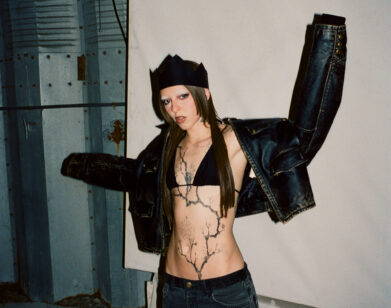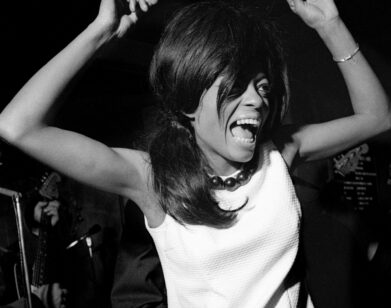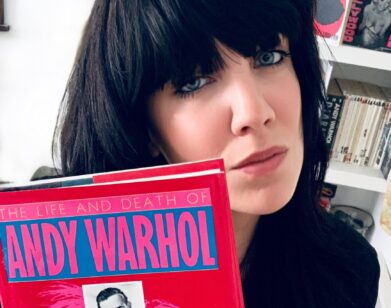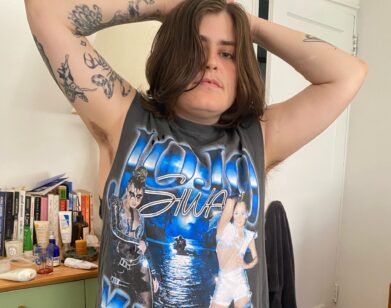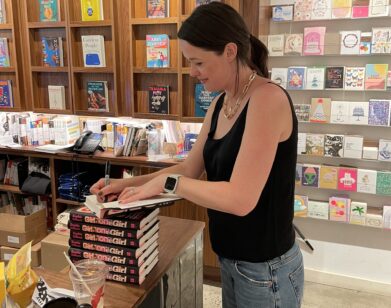add to queue
Arlo Parks Is Listening to Frank Ocean, Funkadelic, and Music for Plants
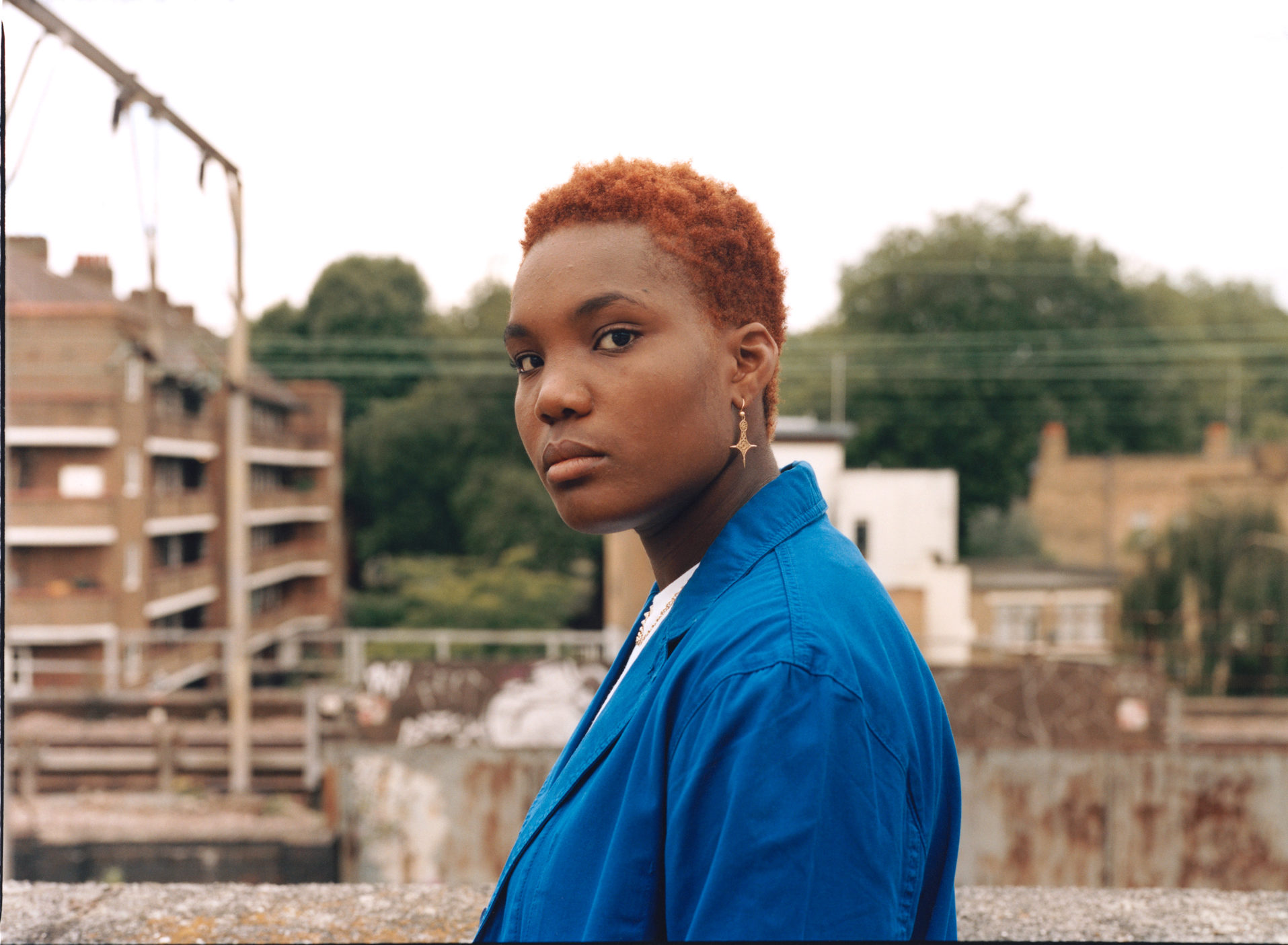
Arlo Parks. Photo by Alex Kurunis.
This is “Add to Queue,” our attempt to sort through the cacophony of music floating in the algorithmic atmosphere by consulting the experts themselves. Our favorite musicians tell us about their favorite music—the sad, the happy, the dinner party-y, the songs they want played at their funeral. In this edition, we speak with Arlo Parks, who will release her debut album of ethereal poetry-pop on January 29, Collapsed in Sunbeams. From Frank Ocean to Funkadelic, ’60s bops to indie-rock, here’s what’s on Parks’s playlist.
———
SARAH NECHAMKIN: I wanted to ask a little bit about your album, specifically about the title and the title song, Collapsed in Sunbeams.
ARLO PARKS: The album title itself came from this book called On Beauty by Zadie Smith. I’ve always been a big fan of her writing. It’s very sensory and physical. And that phrase to me, there was this sense of a sweetness and nostalgia. It felt like surrendering to emotion, and you’re not sure whether that’s melancholy or elation. I like to think of the sun as this healing force. I just wanted it to feel intimate, to feel like I was welcoming people into my own private world with this avalanche of images.
NECHAMKIN: I noticed there’s a lot of color imagery—”Green Eyes,” violet, blue. Were you thinking about colors? Were you visualizing some of that in the way that Zadie writes?
PARKS: I guess so. I think that’s just always been part of my taste. I’m interested in including those hyper-specific details, and I’m a very visual person. I’m very interested in photography and film and how to capture a moment authentically. I think that’s why I gravitate towards color and fruit and textures. It is about making it more of a 3D picture.
NECHAMKIN: What music were you listening to while you were writing and recording the album, if any?
PARKS: I was listening to a lot of music. I’m somebody who needs to be surrounded by music and by new music when I’m writing. That’s probably when I consume the most, just because I’m trying to find inspiration and new ways of seeing music and structuring songs. A lot if it was based off of this stream of consciousness that I wrote and produced in my bedroom, kind of inspired by this band called Florist and a lot of ambient music that I was listening to at the time. I was listening to In Rainbows a lot. Particularly, “Weird Fishes” and “Reckoner.” I was listening to a lot of D’Angelo, I was listening to Voodoo a lot. I was listening to a lot of the Beatles actually, and Slum Village and Beach House. Honestly, everything. I love Aphex Twin as well. I wanted to just pull from a lot of quite different and wide-reaching sonic palettes to create something that felt unique.
NECHAMKIN: It’s funny that you mention In Rainbows because I feel like that’s one album that comes up for almost everyone I ask. Radiohead has been such a lasting influence on artists of all genres.
PARKS: Definitely. They were my most listened to artist on Spotify, and I’ve always been obsessed with Thom Yorke‘s voice and the way that they’re constantly evolving and reshaping and experimenting. I think he portrays melancholy in such a tasteful way.
NECHAMKIN: Who would you say was the earliest musician to influence you?
PARKS: Probably Otis Redding. I have very vivid recollections of listening to “Sitting on the Dock of the Bay” or “Pain in My Heart,” and I just remember his voice really cutting through the noise for me. There was this sense of wistfulness. I remember listening to that song when I was in the car on the way to the shops with my dad when I was really young, and just being really moved and intrigued by it.
NECHAMKIN: And what was your first concert?
PARKS: I was actually quite old. I think my first proper show I was 15 and I went to see Loyle Carner in Shepherd’s Bush with one of my best friends, and it was really an experience. It was my first experience of having that collective side of music because for me it was always very much a private exercise. I’d just put on my headset and go for a wander. But having hundreds of people around you shouting the words just felt so galvanizing. I remember leaving that venue and being like, this is something I want to do.
NECHAMKIN: Do you miss that feeling of the collective? Do you think there’s something that’s been lost for musicians and for everyone in the pandemic, not being able to have that experience?
PARKS: Definitely. I think that playing live is one of the most special experiences. It’s kind of like you lose a layer of connection when it comes to music when you don’t have shows because that’s where I meet the people that are listening to my music. That’s where I connect, that’s where I can explain songs and really experience it in an intimate way with other people. And I think that that’s what I’m missing the most and what I look forward to doing the most with this album.
NECHAMKIN: Does it feel weird to be releasing an album when you’re not sure when you’ll be able to perform it in front of people?
PARKS: I mean, this is my first album, so I’ve never really experienced writing or promoting an album in any other circumstance, so I’m kind of just riding the wave with that one. It’s definitely disheartening to know that it might be a little while before we can play live, but at the same time I’m grateful that I can bring comfort to people in a time when people are listening to music and needing art more than ever.
NECHAMKIN: Is there a song or an album that you’ve listened to during the pandemic that you feel like has carried you through? And, more generally, is there a song that always puts you in a good mood?
PARKS: A song that always puts me in a good mood is “Only You” by Steve Monite. It’s this disco-y track and it just reminds me of being out in the sunshine with my friends and having a little bit of wine and just feeling free. That song really reminds me of summer. And the album that’s been keeping me company is definitely Assume Form by James Blake. I think it has that perfect balance of romance, this sense of growth and healing, this sense of comfort. And whenever I listen to that album, especially songs like “Into the Red” and “Mile High,” it makes me feel like I’m in a dream. James Blake has really kept me company during the pandemic.
NECHAMKIN: Is there a certain artist, or a type of music, that feels like London to you?
PARKS: Hmm, what music feels like London? When I listen to The Streets, that reminds me of London. Or King Krule, especially that first album. When I think of London, I just think of the diversity, I just think of the fact that there are so many different layers and corners and there’s so much life and vibrancy to the city. Those stories really remind me of growing up here, and that sense of home and that sense of excitement that I associate with London.
NECHAMKIN: Do you have a dream collaborator?
PARKS: Frank Ocean is a big one for me. When Channel Orange came out, that was a really definitive moment for me in terms of realizing the fact that pop music can be so idiosyncratic. It can be anything, essentially.
NECHAMKIN: Do you have a favorite movie soundtrack?
PARKS: Hmm, I’m definitely into film, I’m just casting my mind over. Because in the moment I’m always like, “Oh this is amazing,” but I never really go back and listen. I really enjoyed Sufjan Stevens’s work in Call Me By Your Name. I know that’s quite an obvious one to pick, but I was a fan of him, especially the more stripped-back side of his work. Carrie & Lowell is one of my favorite records, so I definitely love that soundtrack.
NECHAMKIN: There are so many times when you’re enjoying a soundtrack but you don’t necessarily go back to it because it doesn’t have memorable lyrics or a hook—it’s more ambient. You did mention ambient music. What kind of ambient music do you throw on?
PARKS: Oh yeah, that’s definitely my thing. I like this album called Plantasia by Mort Garson. It’s actually his music he made for plants, which sounds really strange—the full title is Mother Earth’s Plantasia. I just find it so soothing. I’ve also discovered this album by this artist called Anne Laplantine, and it’s called A Little May Time Be. I just love that sense of having really interesting, strange white noise playing in the background, especially when I’m writing poems or drawing or when I’m just trying to focus. There’s something quite hypnotic about it.
NECHAMKIN: A lot of your songs—I don’t know if you would describe them as breakup songs, but they could be described that way. So what makes the perfect breakup song to you, and what are some of your favorites?
PARKS: The perfect breakup song, for me, has to just have a sense of honesty to it. I think that it has to admit that it’s sad and embrace all the different emotions that come with a breakup. It can be many different things. It can be triumphant, it can be kind of bitter, it can be showing that the person is still a work in progress and working to be happy without someone else. But I think it just has to have that sense of honesty. And I think that that whole My Woman album by Angel Olsen is a good example of that. Songs like “Never Be Mine” pops because she’s going through that whole range of emotions of desperation and being triumphantly apart from someone and wanting them back and realizing how strong she is without them. It has that full range.
NECHAMKIN: Yeah, and it’s not cheesy.
PARKS: Exactly.
NECHAMKIN: Do you ever throw on a cheesy breakup song, or something more mainstream? Do you have any guilty pleasures in general?
PARKS: Yeah, I listen to a lot of Sister Sledge, Britney Spears, Diana Ross. I love pop music that is, I guess you would say cheesy, but I don’t really think it is. I think it’s just fun. I don’t think everything has to operate at the depths of depths of one soul. I think it can just be fun and danceable and I definitely appreciate that. The melody is always so infectious. I really like what Rosalía is doing. I’ve been loving, of course, Billie Eilish‘s stuff. I think that she’s really reshaping the way that we think about pop music. I listen to a lot of the Supremes as well—that sort of ‘60s pop.
NECHAMKIN I’m always listening to the Supremes in the shower or cooking in the kitchen.
PARKS: Exactly! I think that, especially in times like these, you want music that you can just dance to, that you can groove to. I think that there’s something really freeing about just putting on something you know every single word to and belting it.
NECHAMKIN: Speaking of which, pre-pandemic, did you ever do karaoke?
PARKS: Sometimes.
NECHAMKIN: Did you have a go-to song?
PARKS: I think I would sing either “Thinking of You” by Sister Sledge or “Kiss” by Prince. I think those are the two for me, yeah.
NECHAMKIN: I don’t know if you partake, but if you were to smoke, would you have a getting high playlist?
PARKS: Yeah, I don’t really smoke weed or anything, but the album that makes me feel that kind of floaty feeling is Mama’s Gun by Erykah Badu. I also really like listening to Sly and the Family Stone and Parliament-Funkadelic, those old school songs, “There’s a Riot Going On.” And I’m definitely into that more ethereal dreamy music as well. I love Beach House, Clairo. There’s just so much music out there. It’s hard to pick.
NECHAMKIN: If your life were a TV show, what would be the theme song?
PARKS: I think it would probably be something mellow. I think I’d go for “Kerosene!” by Yves Tumor because it has these wild moments of chaos and explosivity, but most of the time it’s kind of meandering. It’s that mixture of mellowness and explosions, it’s quite dramatic.
NECHAMKIN: What kind of TV show do you think it would be? A comedy, a drama?
PARKS: Let me think. Do you know that Netflix show called The End of the Fucking World? Have you seen that?
NECHAMKIN: Yeah, I love that show.
PARKS: Yeah, so that kind of ‘90s vibe. I’d like it to be shot on film, I’d like it to be whimsical. And not the murder part—just the cinematography of it, I can imagine it being cool.
NECHAMKIN: Do you have music that you wake up to, that you go to sleep to every night? Work out to? Get angry to?
PARKS: Yeah. All of them. I usually like to go to sleep to the album Party by Aldous Harding. Also, Songs by Adrianne Lenker, I’ve been loving at the moment. I like to fall asleep to quite stripped down folk but that has substance to it. What have I been waking up to recently? I usually I just go for the coffee straight away. But there’s this album that I’ve been loving by Navy Blue and it’s called Songs of Sage: Post Panic! It has that lo-fi quite grudgey instrumental energy to it, but the lyrics are just so heartfelt and probing and they kind of surround healing and growth and identity. I always find it quite an energizing listen in the morning.
Songs to get angry to? I probably would listen to techno and just go for a run. There’s this artist called Wax that I’ve been loving. On Spotify, all the songs are just numbers. There’s this one called “30,003b,” very creatively named, that is very hypnotic. and I’d probably put that on and just run.
NECHAMKIN: I have one last question. It’s kind of a big one. If you could play one song that would save the world if everyone heard it, what would it be?
PARKS: Wow, okay.
NECHAMKIN: I know. That’s why I save that one for last.
PARKS: Yeah, that’s a tough old question. What song would save the world? Maybe this song called “Is It Any Wonder?” by Durand Jones and the Indications. Just because it has this very soothing, centered energy to it, and whenever I listen to it I feel like my mind goes beyond the immediate feelings I’m having in that moment and just to something broader and wider, and it makes me feel like there is something bigger than myself. So maybe that song. But that was a tough question.
———
Listen to Arlo Parks’s “Add To Queue” playlist below, and follow Interview on Spotify for more.


